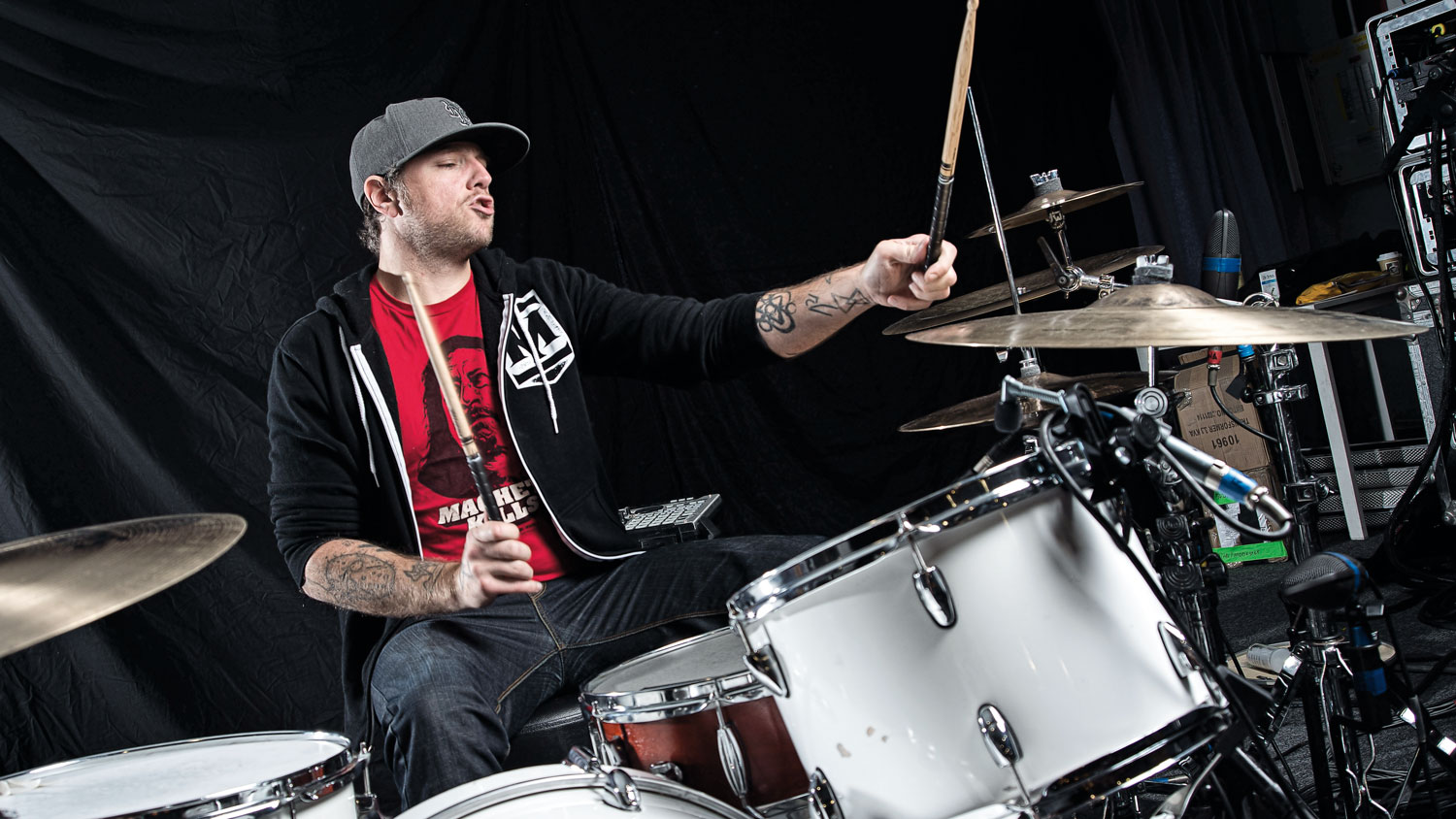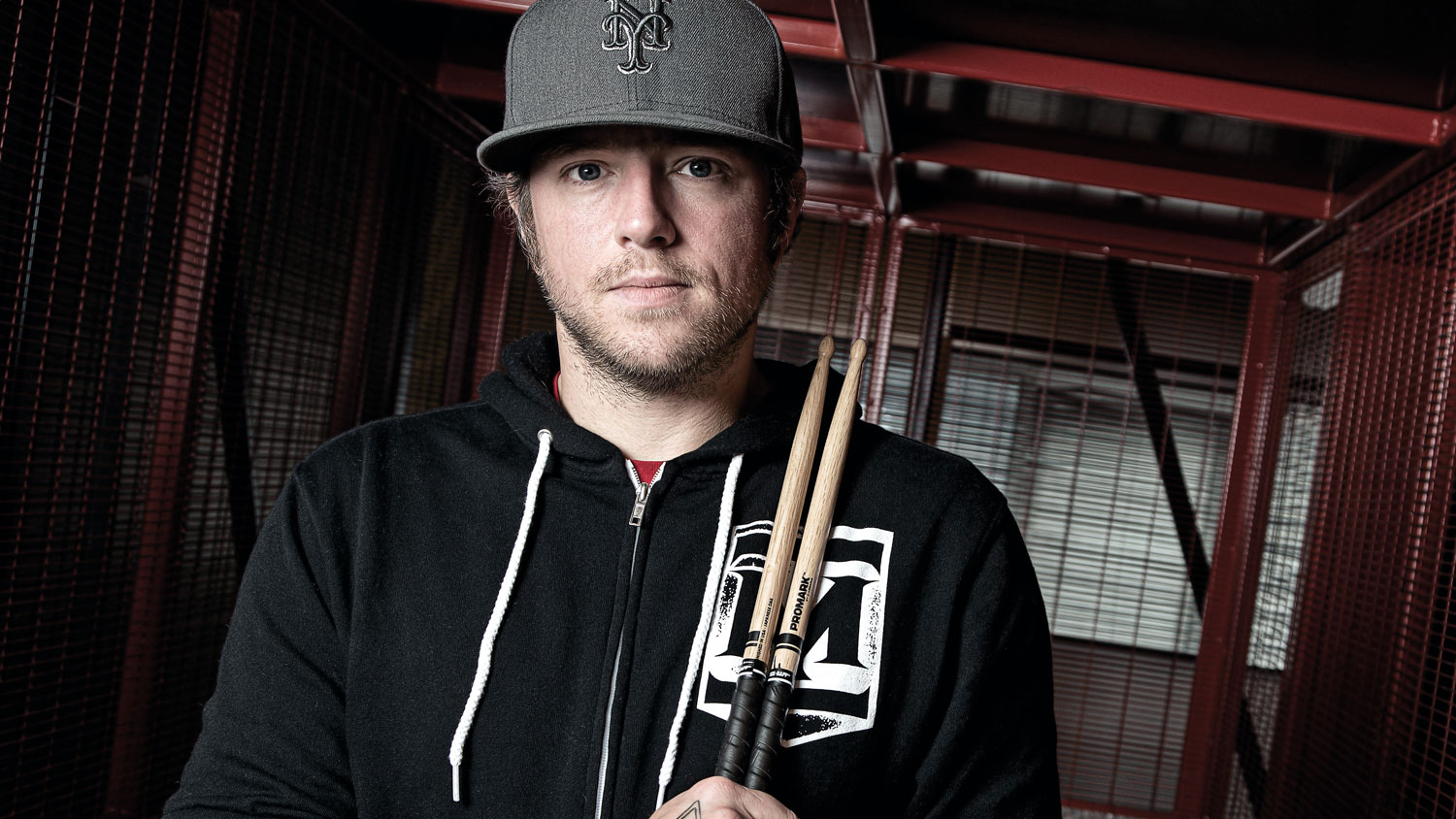Behind the drums – Coheed and Cambria's Josh Eppard: “I always come back to the four-piece kit”
First kits, musical families and priceless advice from Levon Helm

Want all the hottest music and gear news, reviews, deals, features and more, direct to your inbox? Sign up here.
You are now subscribed
Your newsletter sign-up was successful
Given that he plays in the prog-tastic, time-signature shifting Coheed and Cambria, Josh Eppard’s dedication to playing for the song is both admirable and refreshing.
Eppard, who has been with the band since 2000, barring a five-year break between 2006 and 2011, demonstrates both sides of his playing – effortless virtuosity and a canyon-deep pocket – throughout Coheed’s latest record The Unheavenly Creatures.
We caught up with the affable New Yorker and gave him a light grilling behind the kit.
What was your first kit?
“My father is a musician, so my first kit was just pieces of different kits that my dad had acquired through his 20-plus years of playing. It was a yellow kick drum, and to be honest, I don’t even know what brand it was.
“But we had this Ludwig Acrolite snare. That was like my dad’s pride and joy; I’m sure when he first saw me messing with it, he would have been like, ‘Hey. Get your hands off that thing, you little bastard!’
“But pretty soon after, my dad saw that I could play, and he took a real vested interest. I played for a few years on that kit made up of all broken pieces found around the house, and when I was about 12 he bought me my first kit, a Pearl Export.
Want all the hottest music and gear news, reviews, deals, features and more, direct to your inbox? Sign up here.
“That thing was my pride and joy. I still have that kit. I have a deep, strong bond with that kit.”
Lessons or self-taught?
“I never took formal lessons. I saw every day as a lesson because I was learning from the players around me; my father and my brother were both professional musicians, so I was always learning.
I have drum nerd friends who have all of their kits set up and they polish them everyday. I’m not like that at all
How did your career in music start?
“My first band was me and my brother – and, just to give you a clue of how inbred this whole thing is, there was a guy called Chris Bittner in the band. Chris Bittner has produced seven Coheed and Cambria records.
“My dad was the manager of that first band, I had my first major label record deal when I was 16, and Coheed have recorded seven albums in the studio that my father built with the money from my first band’s first record deal. My dad and brother being musicians had a huge impact on my life.”
What’s the best piece of advice you have ever been given?
“One of the things I hold onto now, but I didn’t get it then, was when I was about 12 years old: my dad was rehearsing with a band in the basement, and the drummer was Levon Helm.
“I didn’t know who Levon Helm was at 12 years old. He asks me what kind of drumset I wanted and I told him a six-piece, and he goes, ‘A six-piece? That’s four drums too many.’
“Basically, he was saying I only needed the kick and snare. I wanted to play a gigantic fill in every song, and here was this guy who had had monster success telling me, in a joking way, that it was four drums too many. As I get older, that carries a lot of weight for me. That really is the s***.
“Having worked with producers at the age of 14, I didn’t always understand that a song isn’t about a big drum fill, it’s about the song. If a song is about the big drum fill, then you’ve got a s****y song on your hands. A song is about the song.
“Even in a band like Coheed, which has all of these progressive elements, I still try to incorporate those lessons I learned early on about playing for the song.
“Sometimes I have to remind myself, or maybe Claudio (Sanchez, vocals) will say, ‘Hey, stop throwing the one around, I want to bop my head to this.’
“My kit has evolved over the years – but you know what, it has always gone back to what is comfortable, which is the four-piece kit.
“I have experimented down the years though: I was with C&C for years, but recently switched to Tama, and I have been thrilled with them. Those Tama drummers have made me a better player. Those drums are so versatile.”
Is that a birch kit that you’re now using?
“Now I have a birch/maple mix, but I have had kits that are birch and kits that are maple, and I like the birch/maple mix. It seems very versatile. They can be thunderous, but can also come up and have punch.
“If you listen to our new record there are so many different drum sounds, and they pretty much all come from the same Tama kit.”
Do you collect gear?
“Of course. I think that is a natural byproduct from being in this business. I have amassed so much gear that it lives in different places and in different studios. Also, having a family full of musicians, things get moved around constantly.
“I have one kit that my dad said recently he took off the shells and re-did the finish, and I said, ‘Yeah, those were my drums,’ and he said, ‘Oh s***! [laughs]”
“I have drum nerd friends who have all of their kits set up and they polish them everyday. I’m not like that at all. I’m more of a ‘let’s throw it up and beat the s*** out of it’ kind of guy. I’ll sweat and snot all over my kits.”
Is there a piece of drum kit that you couldn’t live without?
“It’s that Ludwig Acrolite snare that I mentioned earlier. It’s a 1969 drum, it’s my dad’s drum. I only use it in the studio. That drum is just magic. It has crack with a little bit of body.”
What is your greatest strength as a drummer?
“Growing up how I grew up around drummers, I was around groove drummers. I’m proud to be a groove drummer.
“So the stuff I play in Coheed only scratches the surface of my pocket. It’s not really a pocket band, but that is my strength. Playing to the song is something that you can’t teach.”
And how about your biggest weakness?
“Probably my need or want to make everything really interesting. As I got older I went through a drum midlife crisis. At 22, I thought of it as a classy, seasoned player thing to just play a 4/4 beat.
“Now I say, ‘God dammit Claudio, I want to make this interesting.’ I borrow from Lars in Some Kind Of Monster: I say, ‘It just feels stock man, it’s so stock.’ ”

Rich is a teacher, one time Rhythm staff writer and experienced freelance journalist who has interviewed countless revered musicians, engineers, producers and stars for the our world-leading music making portfolio, including such titles as Rhythm, Total Guitar, Guitarist, Guitar World, and MusicRadar. His victims include such luminaries as Ice T, Mark Guilani and Jamie Oliver (the drumming one).
